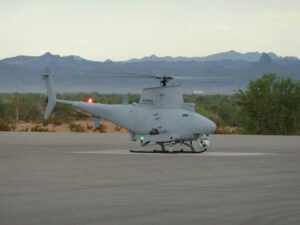The Northrop Grumman Corporation -built MQ-8B Fire Scout unmanned helicopter surpassed 5,000 flight hours while providing critical surveillance capabilities to field commanders in Afghanistan.
Since deploying to Afghanistan in 2011, the MQ-8 Fire Scout system has provided real-time airborne surveillance and targeting supporting counter improvised explosive devices (IEDs), provided targeting support and delivered real-time video to military forces on the ground.
“Fire Scout’s versatility makes it an ideal intelligence-gathering asset for military units on the front line, both on land and at sea,” said Capt. Patrick Smith, program manager, Naval Air Systems Command. “This is a great accomplishment for the entire team and we have leveraged many lessons learned while we develop a more capable Fire Scout system.”
Northrop Grumman is the prime contractor on the Navy’s Fire Scout program. In 2011, the Navy contracted with Northrop Grumman to support Fire Scout deployment to Afghanistan and provide local commanders with real-time intelligence surveillance and reconnaissance (ISR) capability. In the 28 months of deployment, the Navy-Northrop Grumman team provided 5,084 hours of support to U.S. and allied forces.
Additionally, Northrop Grumman is under contract to the Navy to build the first eight of 30 planned Endurance Upgrade Fire Scouts. Those aircraft, which have been designated the MQ-8C, will have twice the endurance, three times the payload capability, and will be ready for operation next year.
“Navy commanders value Fire Scout’s capabilities and recognized early on that a larger helicopter would allow the system to fly longer and carry even larger intelligence, surveillance and reconnaissance payloads,” said George Vardoulakis, vice president for medium-range tactical systems at Northrop Grumman. “What we’ve already done with the current system will be carried over to the new Fire Scout.”
Combined with testing and Fire Scout’s six at-sea deployments aboard Navy frigates, the system has eclipsed 10,000 flight hours supporting naval and ground commanders with critical intelligence-gathering capabilities to respond to threats.



















